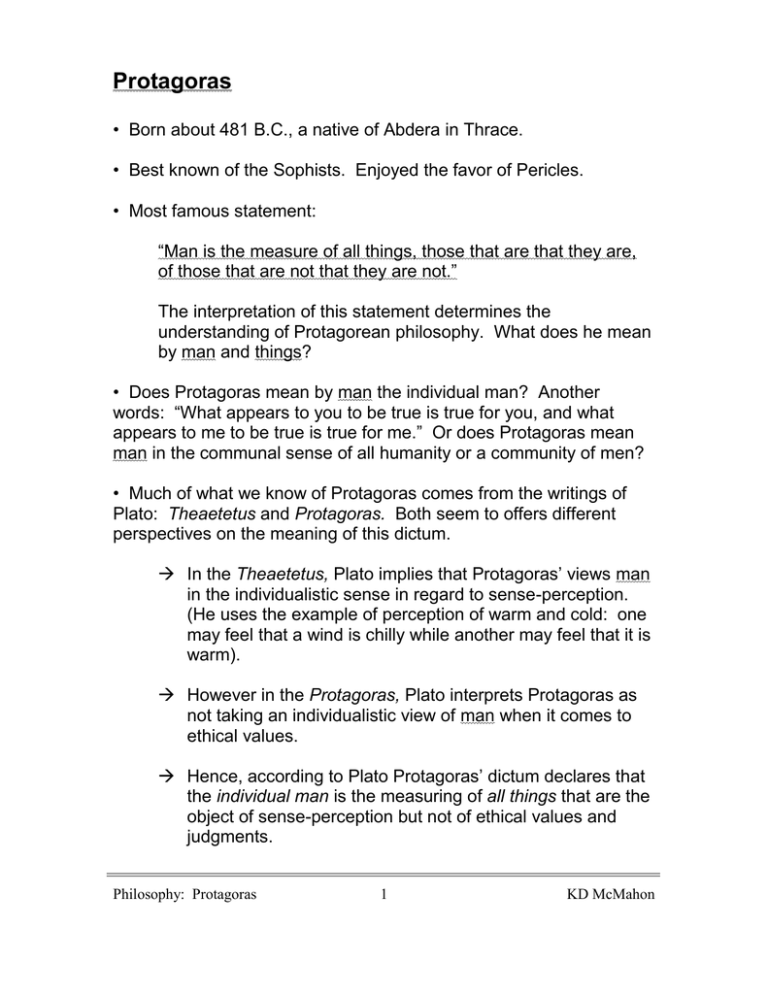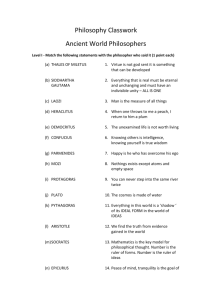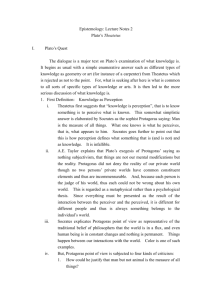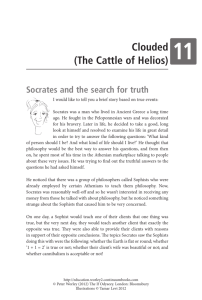11. Protagoras
advertisement

Protagoras • Born about 481 B.C., a native of Abdera in Thrace. • Best known of the Sophists. Enjoyed the favor of Pericles. • Most famous statement: “Man is the measure of all things, those that are that they are, of those that are not that they are not.” The interpretation of this statement determines the understanding of Protagorean philosophy. What does he mean by man and things? • Does Protagoras mean by man the individual man? Another words: “What appears to you to be true is true for you, and what appears to me to be true is true for me.” Or does Protagoras mean man in the communal sense of all humanity or a community of men? • Much of what we know of Protagoras comes from the writings of Plato: Theaetetus and Protagoras. Both seem to offers different perspectives on the meaning of this dictum. In the Theaetetus, Plato implies that Protagoras’ views man in the individualistic sense in regard to sense-perception. (He uses the example of perception of warm and cold: one may feel that a wind is chilly while another may feel that it is warm). However in the Protagoras, Plato interprets Protagoras as not taking an individualistic view of man when it comes to ethical values. Hence, according to Plato Protagoras’ dictum declares that the individual man is the measuring of all things that are the object of sense-perception but not of ethical values and judgments. Philosophy: Protagoras 1 KD McMahon Objects of the senses are of such a character that they cannot become the subject of true and universal knowledge while on ethical values are of such a kind that they can become the subject of true and universal knowledge. [Perhaps more the view of Plato than Protagoras] Then again, in the Theaetetus, Protagoras is depicted as saying that ethical judgments are relative (individualistic): “For I hold that whatever practices seem right and laudable to any particular State are so for that State, so long as it holds by them.” Yet, in Protagoras it is stated that he held that certain ethical tendencies were given to all men by the gods “because cities could not exist if, as in the case of other arts, few men only were partakers of them.” • So how are we to reconcile these conflicting views about the nature of ethics, law and the State? Which represents Protagoras’ authentic views? The Law in general is founded on certain ethical tendencies implanted in all men, but that the individual varieties of Law, as found in particular States, are relative, the law of one State, without being truer than that of another State, being perhaps sounder in the sense of more useful or expedient. That State or city-community would be the determiner of law and not the individual. What is the responsibility of the individual man? He should become educated, and cleave to the ethical traditions of the community. Since no one code is truer than another the individual should not set up his private judgment against the law of the State. The State has the right to rid itself of individuals who do not hearken to the “gifts” of the gods (ethical tendencies). Philosophy: Protagoras 2 KD McMahon Here we see the beginning development of the idea of Natural Law. • Protagoras’ view of the gods: “With regards to the gods, I cannot feel sure either that they are or that they are not, nor what they are like in figure; for there are many things that hinder sure knowledge, the obscurity of the subject and the shortness of human life.” “Just as the moral to be drawn from the relativity of particular codes of law is that the individual should submit himself to the traditional education, so the moral to be drawn from our uncertainty concerning the gods and their nature is that we should abide by the religion of the city. If we cannot be certain of absolute truth, why throw overboard the religion that we inherit from our fathers?” ~ Frederick Copleston (History of Philosophy) • Thus the relativistic philosophy of Protagoras at first may appear revolutionary, it is in fact, supportive of tradition and authority. Philosophy: Protagoras 3 KD McMahon

![Protagoras [No complete works by Protagoras survive. Here are some... preserved in other ancient authors.]](http://s2.studylib.net/store/data/011164317_1-8f965d02c8196183012cff6b9aad18e3-300x300.png)



